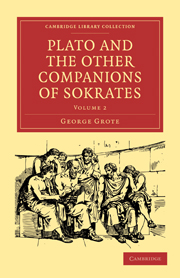CHAPTER XXVI - THEÆTETUS
Published online by Cambridge University Press: 05 October 2010
Summary
Subject and personages in the Theætêtus
In this dialogue, as in the Parmenides immediately preceding, Plato dwells upon the intellectual operations of mind: introducing the ethical and emotional only in a partial and subordinate way. The main question canvassed is, What is Knowledge—Cognition—Science? After a long debate, turning the question over in many distinct points of view, and examining three or four different answers to the question—all these answers are successively rejected, and the problem remains unsolved.
The two persons who converse with Sokrates are, Theôdoras, an elderly man, eminent as a geometrician, astronomer, &c., and teaching those sciences—and Thesetetus, a young man of great merit and still greater promise ; acute, intelligent, and inquisitive—high-principled and courageous in the field, yet gentle and conciliatory to all: lastly, resembling Sokrates in physiognomy and in the flatness of his nose. The dialogue is supposed to have taken place during the last weeks of the life of Sokrates, when his legal appearance as defendant is required to answer the indictment of Melêtus, already entered in the official record. The dialogue is here read aloud to Eukleides of Megara and his fellow-citizen Terpsion, by a slave of Eukleides: this last person had recorded it in writing from narrative previously made to him by Sokrates. It is prefaced by a short discourse between Eukleides and Terpsion, intended to attract our sympathy and admiration towards the youthful Theætêtus.
- Type
- Chapter
- Information
- Plato and the Other Companions of Sokrates , pp. 319 - 395Publisher: Cambridge University PressPrint publication year: 2010First published in: 1865

